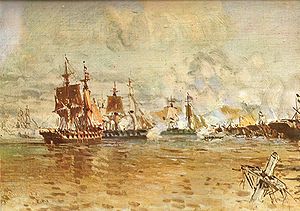Anglo-French blockade of the Río de la Plata
| Anglo-French blockade of the Río de la Plata | |||||||
|---|---|---|---|---|---|---|---|
| Part of the Uruguayan Civil War | |||||||
 The Battle of Vuelta de Obligado, as depicted by Manuel Larravide (1871–1910) |
|||||||
|
|||||||
| Belligerents | |||||||
|
Supported by: |
Supported by: |
||||||
| Commanders and leaders | |||||||
|
|
|
||||||
Pyrrhic Anglo-French military victory
Decisive Argentine political victory
The Anglo-French blockade of the Río de la Plata was a five-year-long naval blockade imposed by France and Britain on the Argentine Confederation ruled by Juan Manuel de Rosas. It was imposed in 1845 to support the Colorado Party in the Uruguayan Civil War and closed Buenos Aires to naval commerce. The Anglo-French navy trespassed into the internal waters of Argentina, in order to sell their products, as Rosas maintained a protectionist policy to improve the weak Argentine economy. Eventually both Britain and France gave in, signing treaties in 1849 (Britain) and 1850 (France) acknowledging the Argentine sovereignty over its rivers.
Buenos Aires faced the French blockade of the Río de la Plata between 1838 and 1840. The Peru–Bolivian Confederation, allied with France, declared the War of the Confederation to Argentina and Chile. Rosas resisted the blockade longer than France estimated he would do, and his strategy of generating disputes between France and England over the blockade eventually gave fruit. France lifted the blockade in 1840, exchanging mutual most favoured nation status between her and the Argentine Confederation.
Unable to deploy French troops during the blockade, France promoted civil wars against Rosas to support the naval actions. For this purpose France aided Fructuoso Rivera against the Uruguayan president Manuel Oribe, who was forced to resign. Oribe escaped to Buenos Aires, and Rosas received him as the legitimate president of Uruguay, denying such recognition to Rivera. This started the Uruguayan Civil War, where the Blancos sought to restore Oribe in power and the Colorados to keep Rivera. As Rivera was hesitant to attack Rosas as the French expected, the Argentine expatriate Juan Lavalle was convinced to do so, but his army bolstered by French troops was nevertheless weakened by desertions and hostility from the local population on their march to Buenos Aires, and French monetary support was curtailed, as France conducted negotiated peace with Rosas by that time. Lavalle's army retreated to the north in disorder, without attacking Buenos Aires as intended.
...
Wikipedia
